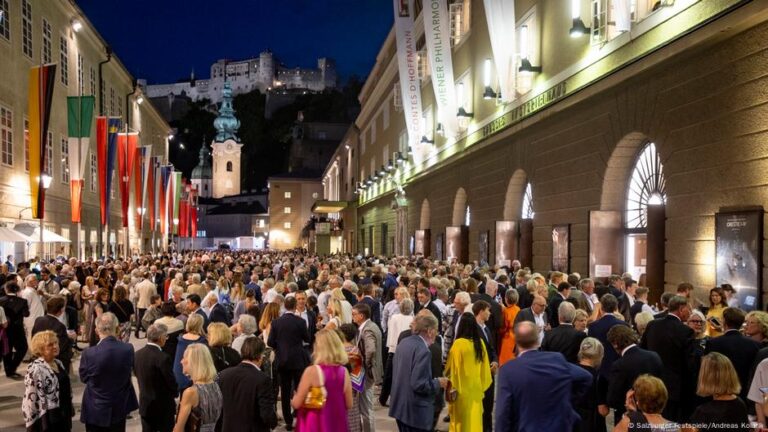Theater is a reflection of the human experience, with all its emotions and conflicts. That’s why the team behind this year’s Salzburg Festival, led by artistic director Markus Hinterhäuser, has put together a program that embodies the crises happening around the world. Bloodshed and power struggles are thus dominating not only events in the world today but also the festival itself (July 18 to August 31). The program spans brutal rivalries from antiquity to the First World War.
Power in focus
There have always been people like Trump and Putin, says Hinterhäuser. The lust for power has been part of world history.
Thus, it comes as no surprise that power, that universal drug, has inspired numerous operas.
For instance, George Frideric Handel’s “Giulio Cesare in Egitto” about Roman general Julius Caesar will be staged, just like Gaetano Donizetti’s “Maria Stuarda,” which is dedicated to Scottish queen, Mary Stuart. Mozart is represented with his opera “Mitridate, re di Ponto,” about the ruler of the fallen empire of Pontus in Asia Minor, and Verdi’s “Macbeth” tells the story of the royal army commander and later Scottish king. And finally, “The Last Days of Mankind,” a play based on Karl Kraus’ disturbing book, deals with the horrors of World War I.
The rulers of the past have one thing in common: Their power is crumbling. And each reacts differently to the inevitable end — whether with rigidity, fear, despair or a choleric attempt to escape fate. Opera, musical theater and stage plays act as a magnifying glass, illuminating the various scenarios of their demise. “This gives us, the audience, the opportunity to act,” says Markus Hinterhäuser. The performing arts open up “spaces of change, of transformation.”
A program for ‘Everyman’
The festival’s website says that around 222,500 tickets are available for a total of 174 opera, drama and concert performances. Musical theater is traditionally the program’s flagship, and this year it features 12 productions ranging from Baroque to contemporary works.
With both unconventional and traditional performances by big-name soloists — such as the annual production of “Jedermann” (or “Everyman”) on the steps of the Salzburg Cathedral — the festival remains true to the guiding principle established over 100 years ago by theater producers Max Reinhardt and Hugo von Hoffmannsthal: To offer something for everyone.
Among others, director Peter Sellars and conductor Esa-Pekka Salonen leading the Vienna Philharmonic orchestra will present a daring new production titled “One Morning Turns into an Eternity.” They will combine Arnold Schoenberg’s monodrama “Erwartung” (Expectation) with the “Der Abschied” (The Farewell) from Gustav Mahler’s symphony “Lied von der Erde” (Song of the Earth) — Schoenberg’s role model.
There is also the play “The Blizzard,” based on a book by Vladimir Sorokin, a well-known Russian writer who fled from Putin and his followers. In a deadly storm, his hero, a young doctor, searches for light and hope.
Even the Greek conductor Teodor Currentzis, a controversial figure on account of his dual Russian citizenship and his unwillingness to distance himself from Russia’s war of aggression against Ukraine, will be back in 2025 with his Utopia Orchestra, an ensemble that Currentzis founded specifically for performances in the West.
Many Russian artists — but not Davydova
In December 2024, the scandal surrounding the dismissal of Russian festival director Marina Davydova overshadowed the presentation of the Salzburg program. The dramaturge — who is also a vocal critic of the Putin regime — was dismissed for breach of contract: Davydova had worked for another festival without informing nor getting authorization to do so from the Salzburg Festival.
Apart from that, the festival program shows a great deal of solidarity with artists who have turned their backs on Putin’s empire: for example, Russian directors Kirill Serebrennikov (Sorokin’s “The Blizzard”), Dmitri Tcherniakov (Handel’s “Giulio Cesare in Egitto”) and Evgeny Titov (Chekhov’s “Three Sisters” in the version by the recently deceased Peter Eotvos) are all participating in Salzburg.
“I make no secret of the fact that, as a pianist, I am a great admirer of the Russian pianistic tradition,” Salzburg Festival director Hinterhäuser told DW. Grigory Sokolov, Arcadi Volodos, Evgeny Kissin, Daniil Trifonov and Alexander Malofeev will perform in Salzburg. They will honor composer and pianist Dmitri Shostakovich in particular with a series of concerts marking the 50th anniversary of his death on August 9.
There are also plans for a reading by Ukrainian author Marianna Kiyanovska from her multi-award-winning work “The Voices of Babyn Yar,” in which she recounts the murder of more than 30,000 Jews by the Nazis in September 1941.
This article was originally written in German.


